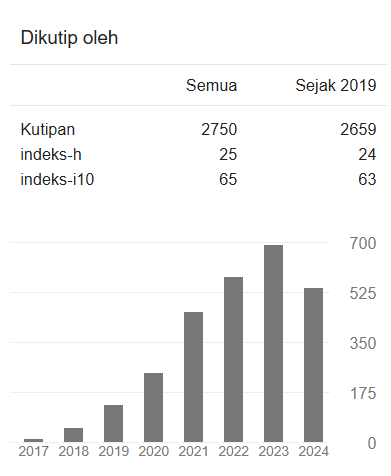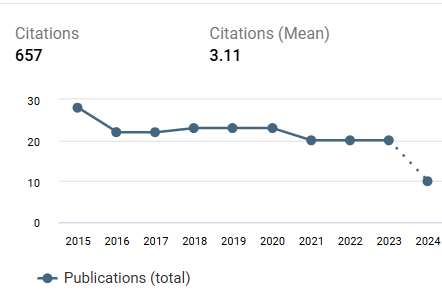Internet of Things for Project-Based Learning in “Vocational High School Building Village Program”
DOI:
https://doi.org/10.22219/jinop.v9i2.26322Keywords:
Project Based Learning, Internet of Things, Vocational School Program to Build Villages, Vocational High School (SMK)Abstract
This study aims to map the setup of an Internet of things-based project-based learning model as a learning medium in the VHS program to develop communities at SMK Negeri 2 Kuningan in West Java. The research technique is a qualitative and quantitative approach engaging class X-XII students in the field of software engineering competence at SMK Negeri 2 Kuningan via exploratory and in-depth observations. Gunungmanik Village, Kuningan, West Java Province was the location of the internet of things-based learning initiative being implemented. The analysis strategy employs Aiken's formula, and the success factor is confirmed by a panel of experts using an analysis interactive model approach that includes data collecting, data reduction, data presentation, and conclusion drawing. According to the finding of the study the internet of things, project-based learning model in the Village Development Vocational School program was classified into three model configurations, namely: 1) Project based learning based on the internet of things as a medium for developing students' vocational skills in completing student work projects by 69%; 2) Project based learning based on the internet of things serves as a learning medium to place theoretical and practical knowledge in the classroom by 73%; 3) Project based learning based on the internet of things as a medium for integrating theoretical-practical learning, collaborative learning solutions to contextual problems providing more autonomy to students in the decision-making process by 74%. The result of this PBL was successful to meet the desired outcomes.
Downloads
References
Almulla, M. A. (2020). The Effectiveness of the Project-Based Learning (PBL) Approach as a Way to Engage Students in Learning. SAGE Open, 10(3). https://doi.org/10.1177/2158244020938702
Carpendale, J., & Cooper, R. (2020). The implementation of project-based learning to enhance the technological-content-knowledge for pre-service physics teacher in ICT courses The implementation of project-based learning to enhance the technological-content-knowledge for pre-service physics . https://doi.org/10.1088/1742-6596/1521/2/022023
Chen, C.-H., & Yang, Y.-C. (2019). Revisiting the effects of project-based learning on students’ academic achievement: A meta-analysis investigating moderators. Educational Research Review, 26, 71–81. https://doi.org/https://doi.org/10.1016/j.edurev.2018.11.001
Direktorat Sekolah Menengah Kejuruan. (2018). Pedoman SMK Membangun Desa. In Kementerian Pendidikan dan kebudayaan. https://doi.org/10.1088/1751-8113/44/8/085201
Edy, D. L., Widiyanti, & Basuki. (2020). Revisiting the Impact of Project-Based Learning on Online Learning in Vocational Education: Analysis of Learning in Pandemic Covid-19. 4th International Conference on Vocational Education and Training, ICOVET 2020, 378–381. https://doi.org/10.1109/ICOVET50258.2020.9230137
Efendi, Y. (2018). Internet Of things (Iot) sistem pengendalian lampu menggunakan raspberry Pi berbasis mobile. Jurnal Ilmiah Ilmu Komputer, 4(2), 19–26. https://doi.org/10.35329/jiik.v4i2.41
Gultom, S. T., Siahaan, P., & Suhandi, A. (2021). Effect of PBL Hybrid Learning on the Higher Order Thinking Skills of Seventh Grade Students in Global Warming and Their Environmental Care Attitudes. Jurnal Penelitian Pendidikan IPA, 7(SpecialIssue), 272–280. https://doi.org/10.29303/jppipa.v7ispecialissue.1012
Guo, P., Saab, N., Post, L. S., & Admiraal, W. (2020). A review of project-based learning in higher education: Student outcomes and measures. International Journal of Educational Research, 102, 101586. https://doi.org/https://doi.org/10.1016/j.ijer. 2020.101586
Hadromi, H., Sudarman, S., Yudiono, H., Budiman, F. A., Majid, M. N., & Permana, K. N. C. (2021). The Learning Strategy Based on Scientific Approach to Strengthen the Employability Skill of Teacher Candidates. International Journal of Instruction, 14(2), 551–570.
Hanif, S., Wijaya, A. F. C., & Winarno, N. (2019). Enhancing Students’ Creativity through STEM Project-Based Learning. Journal of Science Learning, 2(2), 50. https://doi.org/10.17509/jsl.v2i2.13271
Kaur, H. (2019). Internet of things: a review on technologies, architecture, challenges, applications, future trends. Benchmarking: An International Journal, 1–22. https://doi.org/10.1108/BIJ-12-2018-0431
Kumar, S., Tiwari, P., & Zymbler, M. (2019). Internet of Things is a revolutionary approach for future technology enhancement: a review. Journal Big Data, 6(111), 1–21. https://doi.org/10.1186/s40537-019-0268-2
Megayanti, T., Busono, T., & Maknun, J. (2020). Project-based learning efficacy in vocational education : Literature review. IOP Conf. Series:Materials Science and Engineering. https://doi.org/10.1088/1757-899X/830/4/042075
Murniarti, E. (n.d.). PENERAPAN METODE PROJECT BASED LEARNING. 369–380.
Permana, F. H., Chamisijatin, L., & Zaenab, S. (2021). Blended learning berbasis project-based learning untuk meningkatkan kemampuan berpikir kritis. JINoP (Jurnal Inovasi Pembelajaran), 7(2), 209–216. https://doi.org/10.22219/jinop.v7i2.10353
Putra, P. A., Nurcahyo, R., & Farizal. (2021). Critical success factors of e-commerce collaboration in indonesia. Proceedings of the International Conference on Industrial Engineering and Operations Management, 2012, 676–683.
Soesanto, R. H., & Dirgantoro, K. P. S. (2021). Welcome back to face-to-face: A novel Indonesian issue of students’ perceptions towards learning transition. Issues in Educational Research, 31(4), 1249–1269.
Stachura, E. (2021). Designing from afar: the challenges, potentials and limitations of an on-line student design workshop. World Transactions on Engineering and Technology Education, 19(3), 281–286.
Thamrin, T., Saidun Hutasuhut, Aditia, R., & Putri, F. R. (2022). The Effectiveness of the Hybrid Learning Materials with the Application of Problem Based Learning Model (Hybryd-PBL) to Improve Learning Outcomes during the COVID-19 Pandemic. IJORER : International Journal of Recent Educational Research, 3(1), 124–134. https://doi.org/10.46245/ijorer.v3i1.178
Tripathy, B. K., & Anuradha, J. (2018). Internet of things (IoT): technologies, applications, challenges, and solutions. CRC Press LLC.
Usmeldi, U. (2019). The Effect of Project-based Learning and Creativity on the Students’ Competence at Vocational High Schools. 299, 14–17. https://doi.org/10.2991/ictvet-18.2019.4
Villamil, S., Hernández, C., & Tarazona, G. (2020). An overview of internet of things. TELKOMNIKA: Telecommunication, Computing, Electronics and Control, 18(5), 2320–2327. https://doi.org/10.12928/TELKOMNIKA.v18i5.15911
Wahjusaputri, S., Bunyamin, B., & Bakrun. (2021). Critical Success Factors in Implementing Teaching Factory- Based Competency for Vocational High School Students. Cakrawala Pendidikan, 40(3). https://doi.org/http://doi:10.21831/cp. v40i3.2887
Wahjusaputri, S., Fitriani, S., & Syarif, S. (2019). Canvas Model Business as an Innovation of Teaching Factory Learning in the Fashion Department of 27 Public Vocational High School, Jakarta. Dinamika Pendidikan, 14(2), 142–154. https://doi.org/10.15294/dp.v14i2.21167
Welsh, D., Mezhuyev, V., & Irsa, W. (2020). Interdisciplinary terminology framework for teaching and research in learning factories. Procedia Manufacturing, 45, 301–306. https://doi.org/10.1016/j.promfg.2020.04.021
Yunita, Y., Juandi, D., Nurhidayah, I. J., Wibowo, F. C., Astra, I. M., Diana, N., & Sukma, Y. (2019). Study of Implementation of Project Based Learning in Mechanical Engineering Study Program of Vocational High School Study of Implementation of Project Based Learning in Mechanical Engineering Study Program of Vocational High. https://doi.org/10.1088/1742-6596/1165/1/012024
Downloads
Published
How to Cite
Issue
Section
License
Copyright (c) 2023 Bunyamin

This work is licensed under a Creative Commons Attribution 4.0 International License.
Copyright Notice
Authors who publish with JINoP (Jurnal Inoasi Pembelajaran) agree to the following terms:
- For all articles published in the JINoP (Jurnal Inovasi Pembelajaran), copyright is retained by the authors. Authors give permission to the publisher to announce the work with conditions. When the manuscript is accepted for publication, the authors agree to the automatic transfer of the publishing right to the publisher.
- Authors retain copyright and grant the journal the right of first publication with the work simultaneously licensed under a Creative Commons Attribution 4.0 International License. that allows others to share the work with an acknowledgment of the work's authorship and initial publication in this journal.
- Authors are able to enter into separate, additional contractual arrangements for the non-exclusive distribution of the journal's published version of the work (e.g., post it to an institutional repository or publish it in a book), with an acknowledgment of its initial publication in this journal.
- Authors are permitted and encouraged to post their work online (e.g., in institutional repositories or on their website) prior to and during the submission process, as it can lead to productive exchanges, as well as earlier and greater citation of published work (See The Effect of Open Access).








